UAW Announces Volkswagen Workers Filing for Unionization Vote in Tennessee

Volkswagen employees in Chattanooga, TN, have filed a petition with the National Labor Relations Board for a vote to join the UAW. Clearly pleased, the union shared this world with the news on Monday to be accompanied by the requisite media agitprop.
This will be the first time a non-union automotive plant has filed for a union election in quite some time. The UAW called it a “grassroots effort” following the UAW’s previous contract negotiations with Ford, General Motors, and Stellantis.
VW’s facility in Chattanooga is the company’s only assembly facility inside the United States and presently employs roughly 4,300 people. Unlike the automaker’s European factories, it has always lacked union representation. The UAW claimed that a super-majority of eligible workers at the Volkswagen plant had signed union cards over the last three months.
“Today, we are one step closer to making a good job at Volkswagen into a great career,” Isaac Meadows, a production team member in assembly, was quoted by the union as saying. “Right now, we miss time with our families because so much of our paid-time-off is burned up during the summer and winter shutdowns. We shouldn’t have to choose between our family and our job. By winning our union and a real voice at Volkswagen, we can negotiate for more time with our families.”
The UAW is a difficult entity to summarize at present. While the union has historically given workers more bargaining power with businesses that often place maximizing profit ahead of fair compensation, the UAW has likewise been embroiled in numerous corruption scandals showing that past leadership took bribes in exchange for negotiating worse deals for members. However, the current leadership has vowed to do away with the past to create something wholly committed to American laborers.
The union has had mixed success on that front. The UAW moving away from staid bargaining tactics was a major component in negotiating one of the best contracts the union has seen in years. But it has also remained aligned with the Democratic Party, despite leadership repeatedly signaling that it was moving away from political allegiances in 2023.
Fain even took a bow during the last State of the Union Address as Joe Biden claimed that “ together we succeeded” in returning manufacturing to the United States. Biden attributed the success to the United States focusing on electrified vehicles, a major part of his political platform. However, the UAW had been pretty mixed on the prospect of EVs after European labor groups realized that electrification likely wouldn’t need as many domestic workers once the transition was complete.
Germany’s IG Metall has been extremely skeptical of global electrification efforts and the same appears to be true of the American workforce. UAW leadership has been more mixed, however, with Fain suggesting in September of 2023 that the transition to electric vehicles needs to be fair “where it has our labor standards in there, not paying poverty wages and not a race to the bottom, and it's currently driving a race to the bottom.”
Donald Trump has been similarly critical of electrification, suggesting it was taking place too quickly and would likely result in fewer jobs while flooding the market with expensive vehicles nobody wanted to buy. However, Biden was arguably more vocal in terms of publicly signaling his desire to see lofty wage increases among the manufacturing sector. Whatever the reasons, Fain has been far more critical of Trump than Biden and appears to have thrown his hat in with the latter.
The reason the above matters is because the UAW (and unions in general) represent an extremely important voting block. Despite overwhelming evidence that today’s union members aren’t married to either political party, leadership has remained aligned with Democrats and will assuredly encourage their members to vote accordingly.
Keeping the above in mind, one wonders what is in store for Volkswagen’s operations in Tennessee. While the UAW has been broadly unsuccessful in organizing assembly plants operated by foreign automakers, it’s working overtime to try and break that losing streak. However, a majority of these targeted facilities exist in states with Republican leadership that sees welcoming the UAW as a political liability. Ironically, the regions that have brought in the most automotive jobs in the last few decades have likewise been places that are the most anti-union.
The plant in Chattanooga presently builds the Volkswagen Atlas and ID.4 electric crossover. It confirmed that it would “fully support [a National Labor Relations Board] vote so every team member has a chance to vote in privacy in this important decision. The election timeline will be determined by the NLRB."
Previous attempts have failed at the plant. But we’ll see what happens this time around. The NLRB plans on holding a pre-election hearing on March 26th unless the involved groups have settled things among themselves before then. But no outcome will change the UAW’s overarching strategy. In November, the union announced over a dozen campaigns to convert non-union automakers, including Tesla, Rivian, Hyundai, Toyota, BMW and Mercedes-Benz.
[Image: UAW]
Become a TTAC insider. Get the latest news, features, TTAC takes, and everything else that gets to the truth about cars first by subscribing to our newsletter.

A staunch consumer advocate tracking industry trends and regulation. Before joining TTAC, Matt spent a decade working for marketing and research firms based in NYC. Clients included several of the world’s largest automakers, global tire brands, and aftermarket part suppliers. Dissatisfied with the corporate world and resentful of having to wear suits everyday, he pivoted to writing about cars. Since then, that man has become an ardent supporter of the right-to-repair movement, been interviewed on the auto industry by national radio broadcasts, driven more rental cars than anyone ever should, participated in amateur rallying events, and received the requisite minimum training as sanctioned by the SCCA. Handy with a wrench, Matt grew up surrounded by Detroit auto workers and managed to get a pizza delivery job before he was legally eligible. He later found himself driving box trucks through Manhattan, guaranteeing future sympathy for actual truckers. He continues to conduct research pertaining to the automotive sector as an independent contractor and has since moved back to his native Michigan, closer to where the cars are born. A contrarian, Matt claims to prefer understeer — stating that front and all-wheel drive vehicles cater best to his driving style.
More by Matt Posky
Latest Car Reviews
Read moreLatest Product Reviews
Read moreRecent Comments
- Bd2 Lexus is just a higher trim package Toyota. ^^
- Tassos ONLY consider CIvics or Corollas, in their segment. NO DAMNED Hyundais, Kias, Nissans or esp Mitsus. Not even a Pretend-BMW Mazda. They may look cute but they SUCK.I always recommend Corollas to friends of mine who are not auto enthusiasts, even tho I never owed one, and owned a Civic Hatch 5 speed 1992 for 25 years. MANY follow my advice and are VERY happy. ALmost all are women.friends who believe they are auto enthusiasts would not listen to me anyway, and would never buy a Toyota. They are damned fools, on both counts.
- Tassos since Oct 2016 I drive a 2007 E320 Bluetec and since April 2017 also a 2008 E320 Bluetec.Now I am in my summer palace deep in the Eurozone until end October and drive the 2008.Changing the considerable oils (10 quarts synthetic) twice cost me 80 and 70 euros. Same changes in the US on the 2007 cost me $219 at the dealers and $120 at Firestone.Changing the air filter cost 30 Euros, with labor, and there are two such filters (engine and cabin), and changing the fuel filter only 50 euros, while in the US they asked for... $400. You can safely bet I declined and told them what to do with their gold-plated filter. And when I changed it in Europe, I looked at the old one and it was clean as a whistle.A set of Continentals tires, installed etc, 300 EurosI can't remember anything else for the 2008. For the 2007, a brand new set of manual rec'd tires at Discount Tire with free rotations for life used up the $500 allowance the dealer gave me when I bought it (tires only had 5000 miles left on them then)So, as you can see, I spent less than even if I owned a Lexus instead, and probably less than all these poor devils here that brag about their alleged low cost Datsun-Mitsus and Hyundai-Kias.And that's THETRUTHABOUTCARS. My Cars,
- NJRide These are the Q1 Luxury division salesAudi 44,226Acura 30,373BMW 84,475Genesis 14,777Mercedes 66,000Lexus 78,471Infiniti 13,904Volvo 30,000*Tesla (maybe not luxury but relevant): 125,000?Lincoln 24,894Cadillac 35,451So Cadillac is now stuck as a second-tier player with names like Volvo. Even German 3rd wheel Audi is outselling them. Where to gain sales?Surprisingly a decline of Tesla could boost Cadillac EVs. Tesla sort of is now in the old Buick-Mercury upper middle of the market. If lets say the market stays the same, but another 15-20% leave Tesla I could see some going for a Caddy EV or hybrid, but is the division ready to meet them?In terms of the mainstream luxury brands, Lexus is probably a better benchmark than BMW. Lexus is basically doing a modern interpretation of what Cadillac/upscale Olds/Buick used to completely dominate. But Lexus' only downfall is the lack of emotion, something Cadillac at least used to be good at. The Escalade still has far more styling and brand ID than most of Lexus. So match Lexus' quality but out-do them on comfort and styling. Yes a lot of Lexus buyers may be Toyota or import loyal but there are a lot who are former GM buyers who would "come home" for a better product.In fact, that by and large is the Big 3's problem. In the 80s and 90s they would try to win back "import intenders" and this at least slowed the market share erosion. I feel like around 2000 they gave this up and resorted to a ton of gimmicks before the bankruptcies. So they have dropped from 66% to 37% of the market in a quarter century. Sure they have scaled down their presence and for the last 14 years preserved profit. But in the largest, most prosperous market in the world they are not leading. I mean who would think the Koreans could take almost 10% of the market? But they did because they built and structured products people wanted. (I also think the excess reliance on overseas assembly by the Big 3 hurts them vs more import brands building in US). But the domestics should really be at 60% of their home market and the fact that they are not speaks volumes. Cadillac should not be losing 2-1 to Lexus and BMW.
- Tassos Not my favorite Eldorados. Too much cowbell (fins), the gauges look poor for such an expensive car, the interior has too many shiny bits but does not scream "flagship luxury", and the white on red leather or whatever is rather loud for this car, while it might work in a Corvette. But do not despair, a couple more years and the exterior designs (at least) will sober up, the cowbells will be more discreet and the long, low and wide 60s designs are not far away. If only the interiors would be fit for the price point, and especially a few acres of real wood that also looked real.



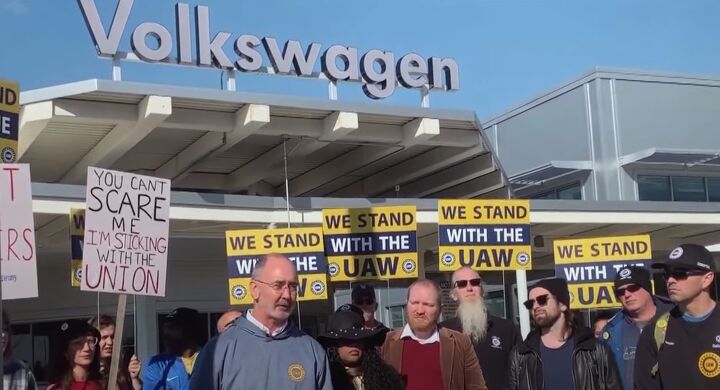


















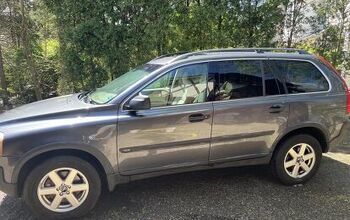
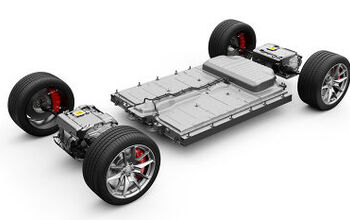



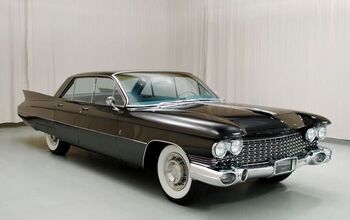



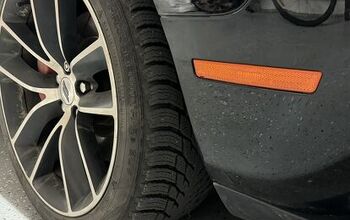


Comments
Join the conversation
VW welcomes the union.
Let's see what happens - the last time this took place, workers signed union cards to get the organizers to stop pestering them, then when it came to a secret vote, they voted 52-48 percent against organizing, with 1,600 workers voting.